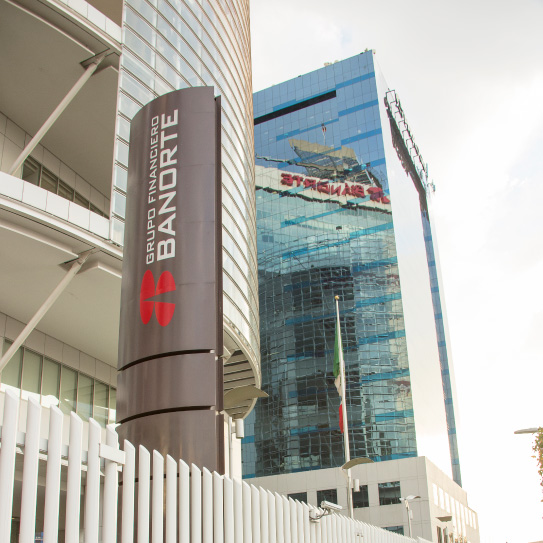+22K employees trained in MLP
98% attendance at Board of Directors’ meetings
90% attendance at Sustainability Committee meetings
The Board of
Directors is the
highest governance body; it takes the actions necessary to ensure that our goals, values and strategies are soundly governed and in keeping with all our stakeholders’ expectations.

102-16
Our actions will always be guided by the principles of integrity, trust and loyalty, with full respect and recognition of the intrinsic value of the human being. GFNorte forbids any form of discrimination on the basis of gender, age, religion, race, social or ethnic origin, physical disability, nationality, sexual preference, family responsibilities, marital status or any other condition that might provide a motive for discrimination. Any individual who feels their rights have been violated may bring their grievance to GFNorte through the channels we make available.
These values are buttressed by a set of unwavering principles.
These principles sum up the conduct that GFNorte requires of its Board members, executives and employees. Every one of these is responsible for learning about the Code of Conduct, and ignorance of this code does not exempt anyone from its terms.
It is these values that have inspired us to continuously improve our clients’ experience, to ensure we are always there for them. And in this year of unexpected and rapid change, we transformed this proximity into a change in our way of being together and communicating. Today we are closer to the needs of Mexican families, thanks to the maturity and constant adaptation of our products and processes. We have achieved this in part through Banorte Cells, a collaborative work scheme involving multi-disciplinary teams made up of experts in the various processes.
Banorte cells represent a culture and a way of working that simply and dexterously offer solutions in our business processes to offer our clients quality service according to their needs.
102-16, 102-17, FN-CB-510a.2, FN-IB-510b.4
The Banorte Code of Conduct provides a general framework for action, adaptable to the changing nature of our environment. Every year we work to keep this Code current and robust by integrating new issues relating to the general market situation as well as those that may have emerged in our day-to-day work.
“
In 2020, close to 60% of employees signed their adherence to the Code of Conduct.”
The issues covered by the Code of Conduct are, among others, conflicts of interest, information confidentiality, conduct with clients, relations with competitors, suppliers and authorities, interpersonal relations and relations with the community, and complaints and grievances.
All employees and senior management are obligated to abide by the Code of Conduct, which strengthens a culture of honesty and responsibility. New hires are taught about this Code as part of the onboarding process, and when they complete this process they sign a statement that they are aware of and will comply with it.
The Internal Audit area also conducts an independent review by means of a questionnaire regarding the Code of Conduct, applied to some of the employees of the audited area. The area’s report confirms the results of this questionnaire, most of which are positive.
An annual review of the Code of Conduct is also mandated by banking process regulations, to ensure that it remains up to date in its context and addresses current issues, so that it can serve as a guide for the actions of all employees working for GFNorte companies.
Proposed changes to the Code are submitted to the Audit and Corporate Practices Committee and after that presented to the Board of Directors for their authorization.
Once the Board approves changes to the document, employees are notified of the modifications through distribution of a regulatory bulletin.
The Code of Conduct is available for consultation on the Institutional Compliance website and on our webpage.
For more details visit:  https://investors.banorte.com/en/governance/policies-and-documents
https://investors.banorte.com/en/governance/policies-and-documents

The EthicsPoint system is a platform available through our corporate intranet, where employees can communicate securely and openly with management or the Board of Directors, regarding problems and concerns relating to unethical or illegal activities, while preserving their anonymity and confidentiality.
EthicsPoint is Safe Harbor-certified through the United States Department of Commerce, as a hotline provider having security measures in place to address EU privacy initiatives and other global privacy directives.
In 2020, 206 complaints were received through the EthicsPoint tool, 80% of them having to do with Human Resources issues and 20% Internal Control matters. These grievances were addressed and investigated by the Human Resources, Comptrollers’ and Internal Audit offices. Of those received, 50% were considered worthy of further investigation, which concluded, when warranted, with a warning or dismissal of the employee, or otherwise ruled out.
102-33, 102-34, 205-1, 205-2, 205-3
The Compliance Department, which reports to the Office of the Comptroller, is responsible for introducing and carrying out programs regarding prevention of money-laundering, terrorism financing and the proliferation of weapons of mass destruction. This department has a team of 102 people who directly monitor client transactions, depending on their degree of risk, administer the policy and present regulatory reports, among other duties. Other teams participate in and support the process indirectly, so that in total more than 200 employees are involved in this effort.
The Comptroller’s office draws up a quarterly report for the Audit and Corporate Practices Committee regarding the activities carried out in each of these areas; this committee in turn informs the Board of the results of its review and issues an opinion on the functioning of the Group’s Internal Control System. In the specific case of terrorism financing and the proliferation of weapons of mass destruction, the Comptroller’s office submits the results of its risk assessment to the Audit and Corporate Practices Committee, the Risk Policies Committee, and the Board of Directors, detailing the level of risk of money-laundering and terrorism financing to which the Group is exposed because of the type of products it offers, as well as the geographic location and type of clients it serves. It also indicates what controls are in place to mitigate these risks.
Board oversight in matters of corruption, bribery, money-laundering and terrorism financing is carried out through the corporate governance bodies appointed by the Board itself for review and evaluation of the aspects of inspection and control. These duties are carried out by the Audit and Corporate Practices Committee—made up of independent members of the Board of Directors—which informs the Board of the result of its reviews on a quarterly basis and issues an opinion on the functioning of the Group’s Internal Control System.
The Risk Policies Committee reports annually to the Board on the design and implementation of the risk assessment model, as well as any changes made to it. This model incorporates a classification of clients’ degree of risk (high, medium or low) with regard to exposure to money-laundering and terrorism financing.
To assist us in our battle against corruption, we have an Anti-Corruption Policy, part of a series of key corporate governance documents related to internal control. The Comptroller’s office coordinates its annual review with various areas of management and keeps this policy up to date, submitting any adjustments or proposing its ratification by the Board of Directors, through the Audit and Corporate Practices Committee. The Comptroller’s office also publicizes the media that GFNorte makes available to its stakeholders for reporting any act or situation in violation of this policy, one of which is the EthicsPoint whistleblowers’ hotline.
Training in the prevention of money laundering, terrorism financing and proliferation of weapons of mass destruction is carried out differently. Board members undergo an annual face-to-face training course on the subject and all employees must take and pass an online course. This online training, which lasts approximately three hours, was given to 22,967 people in 2020. Additionally, employees directly involved in such issues, that is, those who work in the Regulatory Compliance Department, Internal Audit and the international area, receive additional training and participate in international forums; several of them have earned the certification issued by Mexico’s banking regulator, the National Banking and Securities Commission.
Additionally, as part of the onboarding process, newly hired personnel must take a course on this topic, and all GFNorte employees are obligated to be informed of the Code of Conduct—which covers the issues of corruption and bribery—and confirm that they have read and applied it. A course is also offered for the Anti-Corruption Policy, explaining what actions and situations may qualify as corruption.
In the last four years there have been no recorded cases of corruption, and therefore there have been no investigations, corrective measures or fines relating to such matters.

102-18, 102-22, 102-23, 102-24, 102-26, 102-35, 102-36, 103-1, 103-2, 103-3, 405-1, FN-IB-330a.1, FN-AC-330a.1
Grupo Financiero Banorte is Mexico’s Strong Bank, not just because of its reputation and excellence in financial services, but because it applies the best corporate governance and sustainability practices, which has earned us the recognition of Mexican and international organizations.
The Board of Directors is the highest governing body of Grupo Financiero Banorte, charged with taking the actions necessary to ensure that our objectives, values and strategy correspond to what can be expected of sound corporate governance, while safeguarding the interests of shareholders, customers, employees, suppliers and communities.
At GFNorte we make sure to always stay one step ahead. For several years now we have had a policy in place to promote equality between men and women at all levels of the organization. One of the duties of the Nominating Committee is to promote dignity, equity, inclusion and diversity (on the basis of gender, race, nationality, culture, beliefs, language, marital status, ideology, political opinions and other personal, physical or social conditions), to foster an inclusive working environment based on respect and non-discrimination.
“
Our governance is managed through a work group that ensures our policies and organizational bodies are aligned with best international practices, that they conform at all times to the applicable laws and serve the interests of our stakeholders.”
It should be noted that Board member selection and compensation, as well as the conditions under which they perform their duties and activities, are determined exclusively according by criteria of merit and ability to fulfill the requirements of the position.
GFNorte engages the services of a specialized firm to determine the appropriate level of Board member compensation and ensure that it is aligned with international best practices.
Our Internal Control System ensures that we have a set of mechanisms and internal controls to be able to state with confidence that GFNorte and its subsidiaries conform to applicable regulations, in addition to applying methodologies that make it possible to verify their compliance. The Audit and Corporate Practice Committee keeps the Board informed of the status of this system at GFNorte and its financial subsidiaries as well as other corporations it controls, including any irregularities detected.
GFNorte pays special attention to internal control over its transactions, to the origination, processing and disclosure of accounting and financial information, to relationships with investors, customers and suppliers, and to compliance with applicable regulations.

The Code of Conduct establishes the guidelines that must be followed by Board members, officers and employees in the course of their activities and businesses; it also mandates appropriate stewardship of natural resources in the communities where we are present, and if these resources are in any way depleted, it provides for means of replacing them and/or mitigating the environmental damage.
Last year, after an effort lasting 18 months, Banorte was invited to the headquarters of the United Nations (UN) to sign a sustainability commitment based on the Principles for Responsible Banking; expressing our commitment to building a sustainable financial system.
The Board of Directors meets on a quarterly basis and in exceptional cases, at the request of the Chairman of the Board, 25% of the proprietary owners, or the Chairpersons of the Audit and Corporate Practices Committee.
The General Ordinary Annual Shareholders’ Meeting held in April 2020 appointed the following members to the Board.
“
We were invited by the U.N. to sign a sustainability commitment based on the Principles for Responsible Banking.”

| Name | Type | Board member since | |
|---|---|---|---|
| 1 | Carlos Hank González | Related and Chairman | October 2014 |
| 2 | Juan Antonio González Moreno | Related | April 2004 |
| 3 | David Juan Villarreal Montemayor | Related | October 1993 |
| 4 | José Marcos Ramírez Miguel | Related | July 2011 |
| 5 | Carlos de la Isla Corry | Related | April 2016 |
| 6 | Everardo Elizondo Almaguer | Independent | April 2010 |
| 7 | Carmen Patricia Armendáriz Guerra | Independent | April 2009 |
| 8 | Alfredo Elías Ayub | Independent | April 2012 |
| 9 | Adrián Sada Cueva | Independent | April 2013 |
| 10 | David Peñaloza Alanís | Independent | April 2019 |
| 11 | José Antonio Chedraui Eguía | Independent | April 2015 |
| 12 | Alfonso de Angoitia Noriega | Independent | April 2015 |
| 13 | Thomas Stanley Heather Rodríguez | Independent | April 2016 |
One of the duties of the Board is to keep track of the main risks to which the company and the financial entities of the Group (and when such is the case, sub-holdings) are exposed. These risks are identified based on information presented by the committees, the CEO and the external audit firm, as well as the accounting, internal control, internal audit, record-keeping, filing or information systems, which may be transmitted through the committee responsible for audit matters.
Average Board meeting attendance in 2020: 98%
The Audit and Corporate Practices Committee meets on a regular basis 12 times a year, and for extraordinary meetings whenever circumstances require. The Risk Policies committee meets for 12 ordinary and one extraordinary session a year; the Human Resources Committee meets on a quarterly basis; and the Nominations Committee at least once a year or when called by the Chairman of the Board.
Average Committee meeting attendance in 2020:
For more information, visit:  https://investors.banorte.com/en/governance/board-of-directors
https://investors.banorte.com/en/governance/board-of-directors
The Board has established support committees that are made up of independent members of the Board, and in some cases by executives of the institution itself, in keeping with the applicable regulations.
For more details visit:  https://investors.banorte.com/en/governance/support-committees-to-the-board-of-directors
https://investors.banorte.com/en/governance/support-committees-to-the-board-of-directors

| Name | Title |
|---|---|
| José Marcos Ramírez Miguel | Chief Executive Officer |
| José Armando Rodal Espinosa | Chief Wholesale Banking Officer |
| Mario Alberto Barraza Barrón | Chief Retail Banking Officer |
| Fernando Solís Soberón | Chief Development Officer, Products and Segments |
| Carlos Eduardo Martínez González | Chief Government Banking Officer |
| José Francisco Martha González | Chief Digital Business Officer |
| Rafael Arana de la Garza | Chief Financial and Operational Officer |
| Gerardo Salazar Viezca | Chief Risk Management and Credit Officer |
| Javier Beltrán Cantú | Chief Administrator and Human Relations Officer |
| Héctor Ávila Flores | Chief Legal Officer |
| Sergio García Robles Gil | Advisor to the Chairman, Regional Boards |
| Carlos Alberto Rojo Macedo | Advisor to the Chairman |
| Isaías Velázquez González | Chief Audit Executive |
Senior management comprises the positions of Chief Executive Officer, the executives reporting directly to him and the positions reporting directly to them, in other words, the top three levels of the organizational hierarchy. At GFNorte, we have a specific variable compensation plan for this group, subject to meeting certain financial metrics established as targets in our 20/20 Vision. Nevertheless, for security reasons, GFNorte does not publicly disclose the compensation policy, the executive compensation plan, or the individual compensation of members of our senior management.
These financial metrics are quantifiable and measurable over time, and include aspects such as return on equity and efficiency ratio.
In general, the variable compensation plan establishes specific financial targets to be met annually through the year 2020.
The General Shareholders’ Meeting, as the organization’s highest governance body, reviews and votes on approval of the reports by the Board of Directors and the CEO, pursuant to the Law to Regulate Financial Groups. The CEO’s report also includes environmental and social aspects, which are managed through the Sustainability Committee.
In the most recent meeting of the Sustainability Committee, we began to work on developing specific ESG goals that correspond to the area headed by each Committee member. Compliance with these goals is essential to their performance and is consequently one of the factors in determining their compensation.
We know that the progress we have made in terms of sustainability is already ingrained in our operations, so we are now in the process of reviewing senior management’s current ESG targets in order to align them with the criteria that correspond to their respective areas.

102-19, 102-20, 102-26, 102-29
Our Sustainability Committee reports to Banorte’s Chief Executive Officer, and meets on a biyearly basis. Its purpose is to ensure that our sustainability strategy is aligned with the business vision and that it permeates the entire organization. The Committee approves ESG initiatives and manages their performance.
The Committee is made up of the directors of the areas of Economic Analysis (committee president), Sustainability (secretary), Risks, Government Banking, Wholesale Banking, Retail Banking, Human Resources, Material Resources, Communication and Public Relations, Legal Affairs, Comptroller’s office, and a representative from the Internal Audit office who supervises its correct operation.
It operates through three sub-groups aligned with the pillars of our sustainability strategy, to promote new projects and involve all levels of the company.
“
Our Sustainability Committee operates through three sub-groups aligned with the pillars of our sustainability strategy.”
| Meeting | Issues covered | Attendance (percentage) |
|---|---|---|
| March |
|
78% |
| December |
|
90% |